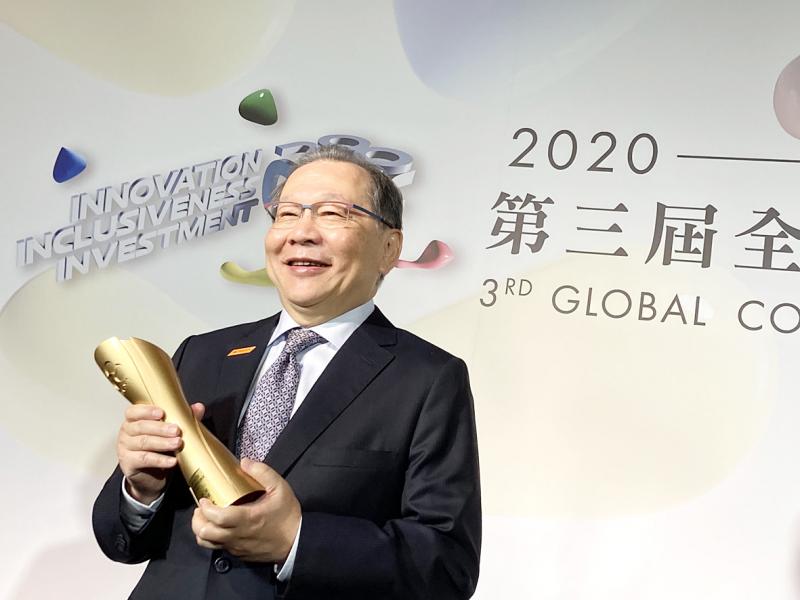MediaTek Inc (聯發科) yesterday became the nation’s second-most valuable listed company after its market capitalization climbed to NT$1.157 trillion (US$40.23 billion) amid investors’ optimism of new business opportunities, while Hon Hai Precision Industry Co (鴻海精密), a major assembler of Apple Inc’s iPhones, fell one notch to third with a market capitalization of NT$1.153 trillion.
The increase in MediaTek’s value came as its shares rallied 4.6 percent to close at NT$728 yesterday, as investors expected the handset chip supplier to benefit from Huawei Technologies Co’s (華為) decision to sell its low-to-mid-range smartphone business under the Honor (榮耀) sub-brand.
On Tuesday, Huawei announced on its Web site that it planned to sell its Honor smartphone business to Shenzhen Zhixin New Information Technology Co Ltd (深圳市智信新信息技術) in its latest efforts to fight US trade sanctions.

Photo: Lisa Wang, Taipei Times
MediaTek has stopped shipping chips to Huawei since the US ban took effect on Sept. 15.
The latest deal is a boon for MediaTek, as it could resume chip supply for Honor smartphones, if Washington exempts the brand under the new ownership from the sanctions, Jih Sun Securities Investment Consulting Co (日盛投顧) said in a note.
MediaTek supplies its 5G chip, Dimensity 800, to Honor phones.
Honor’s other local suppliers, including Novatek Microelectronics Corp (聯詠科技) and Sensortek Technology Corp (昇佳), would also benefit from Huawei cutting ties with the smartphone brand, Jih Sun said.
Novatek supplies integrated circuits for Honor displays, while Sensortek supplies optical sensors, it said.
Huawei annually shipped between 60 million and 70 million Honor phones over the past few years, the consultancy said.
However, MediaTek said it is cautious about the effect.
Asked about potential shipments to Honor, MediaTek chief executive officer Rick Tsai (蔡力行) said that the company is assessing the situation.
“The deal has just been announced,” Tsai said.
However, MediaTek is not concerned about its competitor, Qualcomm Inc, that received the US government’s approval to ship 4G chips to Huawei, Tsai said, adding that MediaTek has outperformed its competitors and this year gained market share in the 4G and 5G mobile phone chip segments worldwide, he said.
“Since smartphone demand is to rebound next year, we are not worried. The world economy will be in a good shape next year,” Tsai said.
MediaTek last month forecast that global 5G smartphone shipments would experience a high-speed growth next year, more than doubling from this year’s 200 million units.

CHIP RACE: Three years of overbroad export controls drove foreign competitors to pursue their own AI chips, and ‘cost US taxpayers billions of dollars,’ Nvidia said China has figured out the US strategy for allowing it to buy Nvidia Corp’s H200s and is rejecting the artificial intelligence (AI) chip in favor of domestically developed semiconductors, White House AI adviser David Sacks said, citing news reports. US President Donald Trump on Monday said that he would allow shipments of Nvidia’s H200 chips to China, part of an administration effort backed by Sacks to challenge Chinese tech champions such as Huawei Technologies Co (華為) by bringing US competition to their home market. On Friday, Sacks signaled that he was uncertain about whether that approach would work. “They’re rejecting our chips,” Sacks

NATIONAL SECURITY: Intel’s testing of ACM tools despite US government control ‘highlights egregious gaps in US technology protection policies,’ a former official said Chipmaker Intel Corp has tested chipmaking tools this year from a toolmaker with deep roots in China and two overseas units that were targeted by US sanctions, according to two sources with direct knowledge of the matter. Intel, which fended off calls for its CEO’s resignation from US President Donald Trump in August over his alleged ties to China, got the tools from ACM Research Inc, a Fremont, California-based producer of chipmaking equipment. Two of ACM’s units, based in Shanghai and South Korea, were among a number of firms barred last year from receiving US technology over claims they have

It is challenging to build infrastructure in much of Europe. Constrained budgets and polarized politics tend to undermine long-term projects, forcing officials to react to emergencies rather than plan for the future. Not in Austria. Today, the country is to officially open its Koralmbahn tunnel, the 5.9 billion euro (US$6.9 billion) centerpiece of a groundbreaking new railway that will eventually run from Poland’s Baltic coast to the Adriatic Sea, transforming travel within Austria and positioning the Alpine nation at the forefront of logistics in Europe. “It is Austria’s biggest socio-economic experiment in over a century,” said Eric Kirschner, an economist at Graz-based Joanneum

OPTION: Uber said it could provide higher pay for batch trips, if incentives for batching is not removed entirely, as the latter would force it to pass on the costs to consumers Uber Technologies Inc yesterday warned that proposed restrictions on batching orders and minimum wages could prompt a NT$20 delivery fee increase in Taiwan, as lower efficiency would drive up costs. Uber CEO Dara Khosrowshahi made the remarks yesterday during his visit to Taiwan. He is on a multileg trip to the region, which includes stops in South Korea and Japan. His visit coincided the release last month of the Ministry of Labor’s draft bill on the delivery sector, which aims to safeguard delivery workers’ rights and improve their welfare. The ministry set the minimum pay for local food delivery drivers at